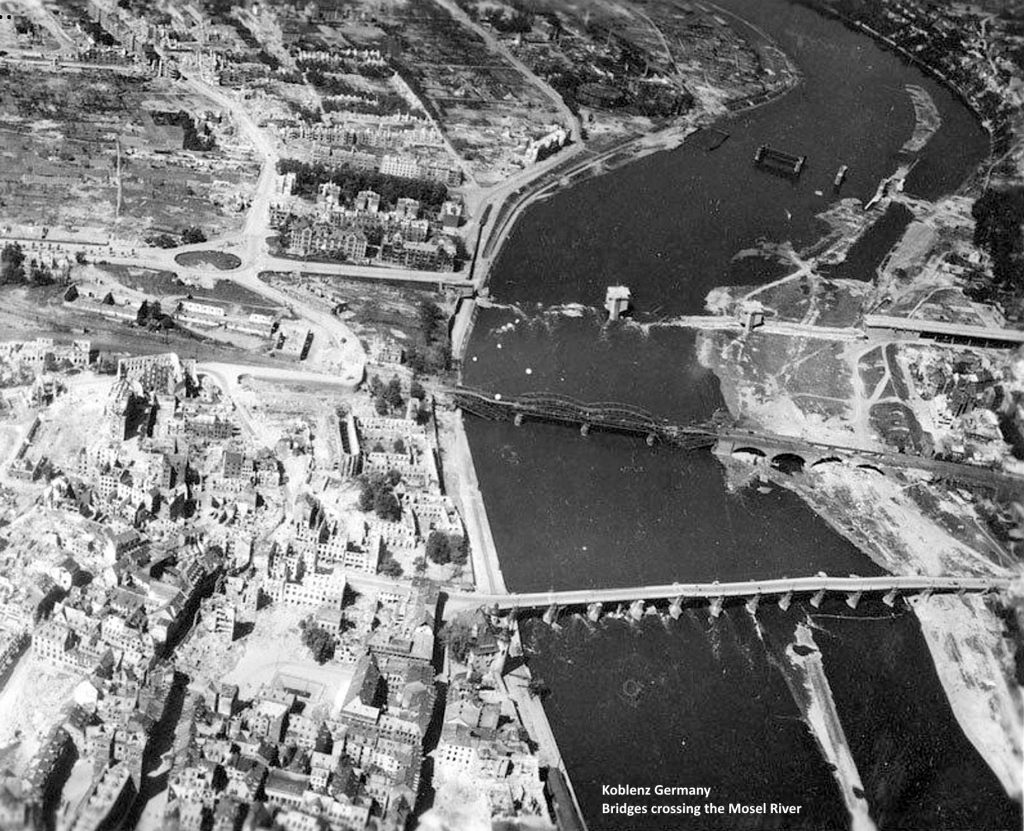 There was a Jewish Lieutenant with us who spoke Hebrew and this was close enough to some German to suffice for communication but we did not want to make this fact known because of our knowledge of the German treatment of the Jews and we were as afraid for the Lieutenant as he was for himself. After what seemed to be hours of pushing, shoving, dodging, cursing, and running we were on our way out of Koblenz heading in a northeasterly direction which was consistent with the previously mentioned town of Falkenberg and our hopes for finally getting a ride on a train were rising. Walking mile after mile had given us time to reflect on our situation. We had settled down to some of the reality of being prisoners but I don’t think anyone truly accepted it. We talked optimistically about how our Allied Forces would break through the German lines anytime now, cross the Rhine River, and liberate us. We had no appreciation of the size or strength of the German drive, nor did we know at this point that it was an all-out life-and-death struggle offensive for them. They were determined to break the back of the Allied Offensive and turn the tide of the war in their favor. In our limited space and understanding, we had already begun to be more concerned with our survival than the war. We were struggling with hunger, inadequate clothing, shock, cold, and inhuman treatment. The population was hostile toward us and we had no hope of help from them regarding food, shelter, or compassion. It was interesting to note that the Northern Germans were extremely hostile toward us, spitting on us as we would pass groups of them, shouting obscenities at us, and even throwing objects at us; while the Southern Germans, as we found later, were more compassionate and apt to help us whenever it was safe for them to do so.
There was a Jewish Lieutenant with us who spoke Hebrew and this was close enough to some German to suffice for communication but we did not want to make this fact known because of our knowledge of the German treatment of the Jews and we were as afraid for the Lieutenant as he was for himself. After what seemed to be hours of pushing, shoving, dodging, cursing, and running we were on our way out of Koblenz heading in a northeasterly direction which was consistent with the previously mentioned town of Falkenberg and our hopes for finally getting a ride on a train were rising. Walking mile after mile had given us time to reflect on our situation. We had settled down to some of the reality of being prisoners but I don’t think anyone truly accepted it. We talked optimistically about how our Allied Forces would break through the German lines anytime now, cross the Rhine River, and liberate us. We had no appreciation of the size or strength of the German drive, nor did we know at this point that it was an all-out life-and-death struggle offensive for them. They were determined to break the back of the Allied Offensive and turn the tide of the war in their favor. In our limited space and understanding, we had already begun to be more concerned with our survival than the war. We were struggling with hunger, inadequate clothing, shock, cold, and inhuman treatment. The population was hostile toward us and we had no hope of help from them regarding food, shelter, or compassion. It was interesting to note that the Northern Germans were extremely hostile toward us, spitting on us as we would pass groups of them, shouting obscenities at us, and even throwing objects at us; while the Southern Germans, as we found later, were more compassionate and apt to help us whenever it was safe for them to do so.
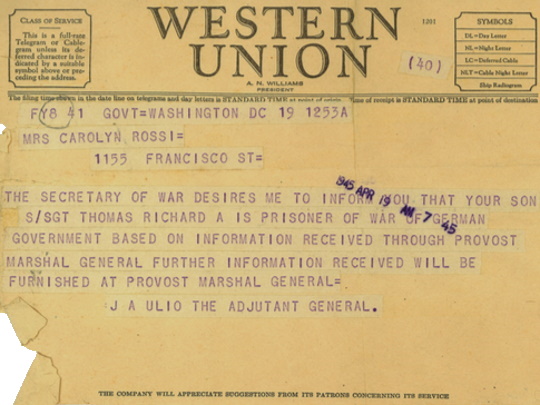 One has to consider, however, that we encountered the Southern Germans months later, and much nearer the end of the war when they had finally realized that defeat was imminent. Early in the morning of the second or third day of walking, we heard the strange haunting sound of bagpipes floating over the column. We were puzzled as to the source of this music but soon learned that an Army Colonel who also had been captured had always carried bagpipes with him in battle as a hobby and had managed to salvage them even in the heat of battle. It seems that he was using them to lead us, and seemingly trying to unite us in our thinking and establish an Esprit de Corps which was badly needed. We later learned that he was the ranking officer and the one the Germans used in an attempt to maintain order and get their major points across to us. In general, we all felt strangely reassured by this and felt more of a unit than at any time previously. It seems always to take a disaster to unite opposing forces, overcome petty differences, and stiffen the camaraderie necessary for survival. At this point, we were still fairly well-civilized and apt to share cigarettes, extra clothing, and ideas, a situation that was to change drastically for the worse in the following weeks and months. This occurred in direct proportion to the increased cold, hunger, and fatigue.
One has to consider, however, that we encountered the Southern Germans months later, and much nearer the end of the war when they had finally realized that defeat was imminent. Early in the morning of the second or third day of walking, we heard the strange haunting sound of bagpipes floating over the column. We were puzzled as to the source of this music but soon learned that an Army Colonel who also had been captured had always carried bagpipes with him in battle as a hobby and had managed to salvage them even in the heat of battle. It seems that he was using them to lead us, and seemingly trying to unite us in our thinking and establish an Esprit de Corps which was badly needed. We later learned that he was the ranking officer and the one the Germans used in an attempt to maintain order and get their major points across to us. In general, we all felt strangely reassured by this and felt more of a unit than at any time previously. It seems always to take a disaster to unite opposing forces, overcome petty differences, and stiffen the camaraderie necessary for survival. At this point, we were still fairly well-civilized and apt to share cigarettes, extra clothing, and ideas, a situation that was to change drastically for the worse in the following weeks and months. This occurred in direct proportion to the increased cold, hunger, and fatigue.
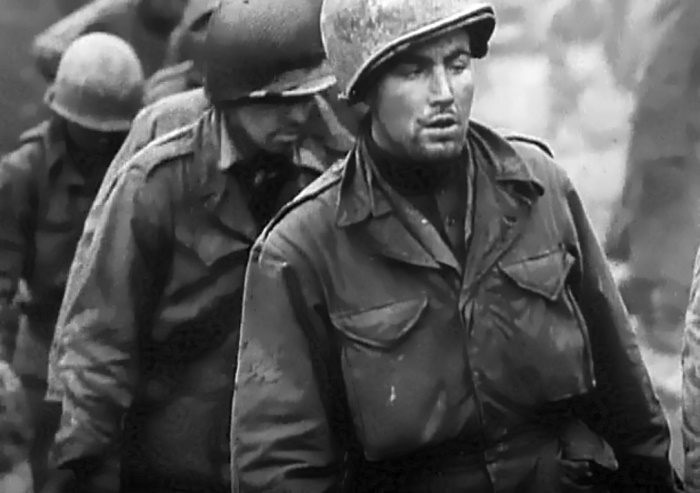 The basic survival drive was insidiously rearing its head. An example of this was when some of the men who knew a little German had learned that the German word for ‘hot’ is ‘heiss’ but did not share this knowledge with others who were not aware of it. This only becomes important when you realize that in extreme cold, anything hot, even water, can be vital. These men had been getting hot water from farmhouses as we progressed, with the rest of us thinking that ‘heiss’ meant cold and avoiding any offer of this ‘cold water’; thinking how dumb the others were to introduce anything cold into their bodies – we were using snow for our fluid bulk. After we learned the truth, it got to be a dog-eat-dog effort to get to the ‘Heiss’ water first. The relief of being away from the battlefront, and in less danger was counteracted by a growing awareness that we were beginning to wear down and getting on each other’s nerves more and more. The distance we had traveled was pointed out to us when the German Guard Company accompanying us had to be relieved by another because the guards were unable to keep up the pace of 20 miles a day, even though they had been eating regularly, while we had not. Our guards were men who could not be in battle and as a result, were not physically capable of maintaining any rigorous activity for a long time. At this point, we were still in fairly good physical condition and seemed to be able to handle the situation adequately.
The basic survival drive was insidiously rearing its head. An example of this was when some of the men who knew a little German had learned that the German word for ‘hot’ is ‘heiss’ but did not share this knowledge with others who were not aware of it. This only becomes important when you realize that in extreme cold, anything hot, even water, can be vital. These men had been getting hot water from farmhouses as we progressed, with the rest of us thinking that ‘heiss’ meant cold and avoiding any offer of this ‘cold water’; thinking how dumb the others were to introduce anything cold into their bodies – we were using snow for our fluid bulk. After we learned the truth, it got to be a dog-eat-dog effort to get to the ‘Heiss’ water first. The relief of being away from the battlefront, and in less danger was counteracted by a growing awareness that we were beginning to wear down and getting on each other’s nerves more and more. The distance we had traveled was pointed out to us when the German Guard Company accompanying us had to be relieved by another because the guards were unable to keep up the pace of 20 miles a day, even though they had been eating regularly, while we had not. Our guards were men who could not be in battle and as a result, were not physically capable of maintaining any rigorous activity for a long time. At this point, we were still in fairly good physical condition and seemed to be able to handle the situation adequately.
 The German Guard was utilizing contact with farms, along with their own daily rations to maintain their diet. They had none to share with us. In a way this made us feel superior to them, which in our own American way always had been true, but in another way, it all seemed so very unfair.
The German Guard was utilizing contact with farms, along with their own daily rations to maintain their diet. They had none to share with us. In a way this made us feel superior to them, which in our own American way always had been true, but in another way, it all seemed so very unfair.
For a while, our spirits were up but our stomachs were still empty and the morale boost was short-lived. Small towns came and went. There seemed to be no goal but always there was talk of a train ride which in itself began to have value as a goal and would help us get through the endless foot-in-front-of-a-foot miles we were covering. About 5 days after we had been captured and after we had already walked about 100 miles, two unexpected and frightening events occurred deepening our insecurity; making it quite clear that we had no control whatsoever about our treatment or destiny. There had been talk of the possible use of poison gas in the German offensive action against the Allies. This had been discussed by the guards who had been responsible for us. The rumors went from one end of our long straggly line of men to the other end.
The use of poison gas had of course been outlawed but then who makes and keeps the rules in a life and death struggle situation like a war? Using us as prisoners, and seemingly as hostages, in an attempt to prevent retaliation on the part of the Allies for their use of poison gas; the German guards ordered us to throw away our gas masks.
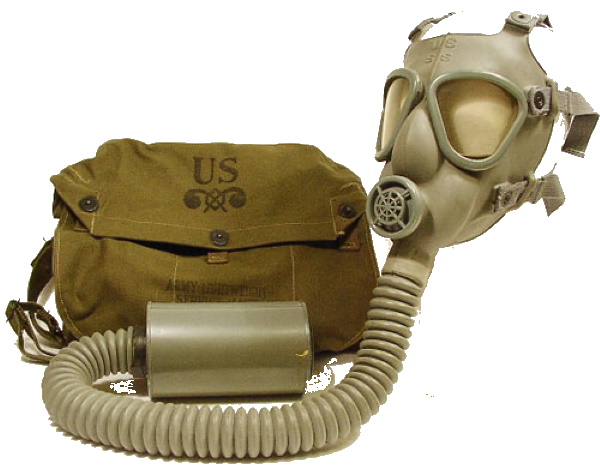 Any refusal to do so was considered an act of rebellion and punishable by being shot. Now we were stripped of a vital protective piece of equipment and did not hesitate to let our feelings be known. We began swearing at the guards at the top of our lungs but to no avail. Our pleading and shouting fell on deaf ears. We continued to grumble in true American style. Our outburst was followed by another order to throw away all of our mess gear (eating equipment), knives, forks, spoons, cups, and aluminum plates.
Any refusal to do so was considered an act of rebellion and punishable by being shot. Now we were stripped of a vital protective piece of equipment and did not hesitate to let our feelings be known. We began swearing at the guards at the top of our lungs but to no avail. Our pleading and shouting fell on deaf ears. We continued to grumble in true American style. Our outburst was followed by another order to throw away all of our mess gear (eating equipment), knives, forks, spoons, cups, and aluminum plates.
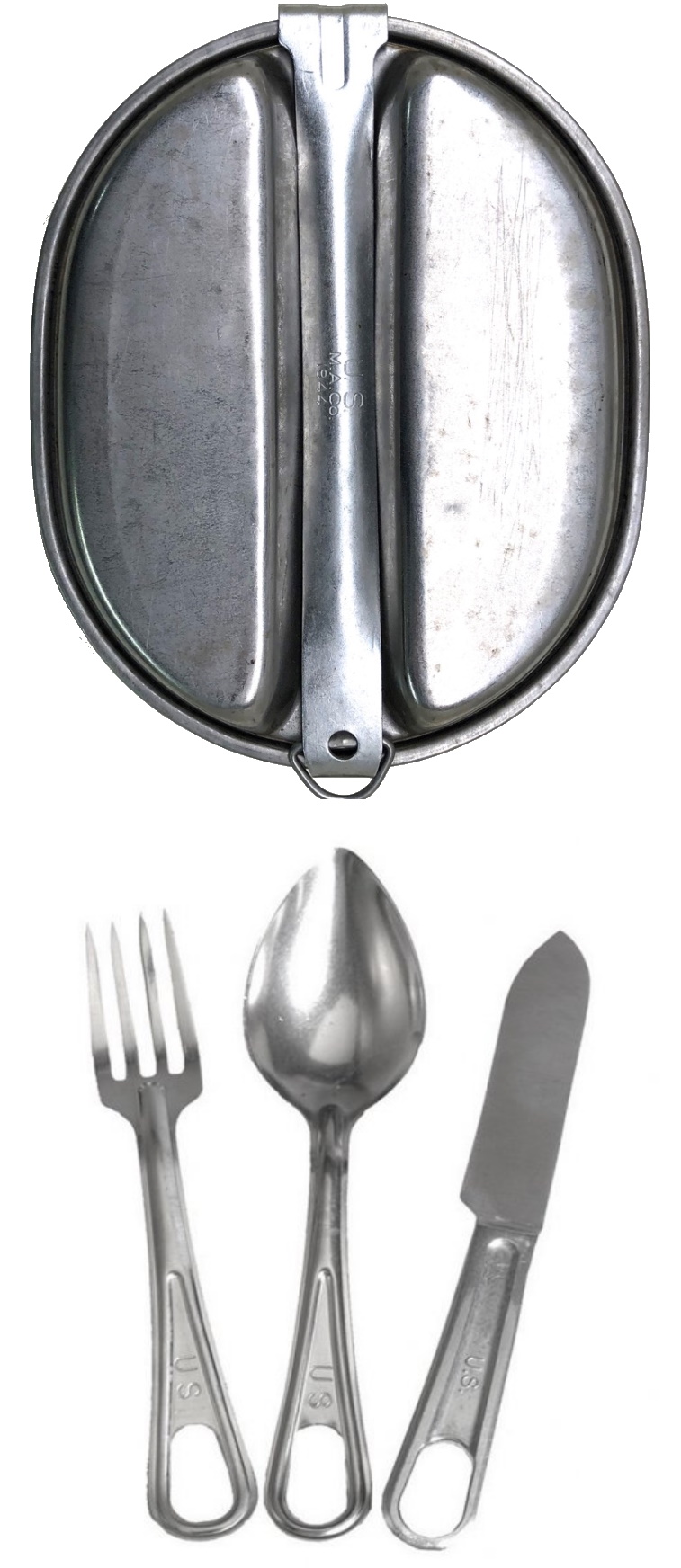 Again we protested in the loudest possible manner but again there was no relenting. This time the guards showed irritation, began to threaten us, and even struck some of the louder protestors. The unbelievable clatter of metal being thrown down expressed quite well our resentment and hostility toward the guards and the loss of our equipment. Except for the knives, there seemed to be no justification for taking away our means of obtaining or preparing food even if we should ever be able or lucky enough to locate any. Shortly after stripping us of the equipment, we were led into what appeared to be an old abandoned makeshift prison camp. The buildings were falling from lack of maintenance, the barbed wire enclosures were falling and the buildings lacked paint. Even the stairs approaching the buildings were broken. The siding had been ripped off or blown away so that protection from the wind was minimal. By now the temperature had fallen well below the freezing mark and the winds were gusting up to 40 miles per hour, making the chill factor devastating. We were lined up outside the buildings in long rows and allowed to enter only a few at a time. Once inside, the bleakness was even more overwhelming. There were a few tables scattered around and there were German officers or possibly administrative help seated at these tables. In an adjoining room, there was a shower and what appeared to be a team of medical personnel. We were told to empty our pockets of everything and put the contents on the table while one soldier went through the items, taking each piece of paper out of our wallets, including our medical records, pictures of family, driver’s licenses, and so on. Another was asking questions such as ‘your name, your rank, your army unit, where were you captured’ and on and on.
Again we protested in the loudest possible manner but again there was no relenting. This time the guards showed irritation, began to threaten us, and even struck some of the louder protestors. The unbelievable clatter of metal being thrown down expressed quite well our resentment and hostility toward the guards and the loss of our equipment. Except for the knives, there seemed to be no justification for taking away our means of obtaining or preparing food even if we should ever be able or lucky enough to locate any. Shortly after stripping us of the equipment, we were led into what appeared to be an old abandoned makeshift prison camp. The buildings were falling from lack of maintenance, the barbed wire enclosures were falling and the buildings lacked paint. Even the stairs approaching the buildings were broken. The siding had been ripped off or blown away so that protection from the wind was minimal. By now the temperature had fallen well below the freezing mark and the winds were gusting up to 40 miles per hour, making the chill factor devastating. We were lined up outside the buildings in long rows and allowed to enter only a few at a time. Once inside, the bleakness was even more overwhelming. There were a few tables scattered around and there were German officers or possibly administrative help seated at these tables. In an adjoining room, there was a shower and what appeared to be a team of medical personnel. We were told to empty our pockets of everything and put the contents on the table while one soldier went through the items, taking each piece of paper out of our wallets, including our medical records, pictures of family, driver’s licenses, and so on. Another was asking questions such as ‘your name, your rank, your army unit, where were you captured’ and on and on.
All that is required according to the Geneva Convention is that you give your Name, Rank, and Serial Number; which of course is what we did. It is one thing to learn this procedure in a training situation during basic training in the United States and quite another to be facing an enemy who does everything in his power to degrade and intimidate you. Some of us, Captains and above were taken into another more comfortable office filled with filing cabinets, a makeshift desk, and some chairs. The occupants of this room were a German Captain and a couple of armed guards. The Captain spoke perfect English and put on a show of being amiable in his communication with us. The amazing thing about this encounter was when he pulled a rather complete file on some of us, knowing where we had been born, our age, our parents’ names, and even the schools we had attended. He was quick and proud to announce that he had spent much time in the United States before the war, in such places as Buffalo, New York, Cleveland, Ohio, and several other places.
 We were inclined to suspect that this was a set up to gain our confidence or give the impression that there was nothing we could tell him that he did not already know but we did not make a point of challenging him with this suspicion. The Captain then chose to talk to each of us alone, going into great detail about our background and, in my case, telling me that my grandparents had left Germany in 1882, which was a fact; even knowing that they came from Dresden, Germany. He then proceeded to question me about my loyalty to the ‘Fatherland’, asking how I could join the Americans against my ‘Homeland’ and fight my own people. He said that this disloyalty was going to result in my being on the losing side. I stated that I did not feel that this was the case but he cut me short and offered a proposal which I’m sure he thought I could not refuse. He told me that if I joined the German Army my post would be in Berlin where I would enjoy ‘wine, women, and song’ for the duration of the war and that I could then become a German citizen. He ranted and raved about my stupidity when I told him the whole idea was crazy. He said he would give me time to reconsider. I assured him that there would be no consideration at all. He then summoned another officer who apparently got the same treatment as I had gotten and with the same results.
We were inclined to suspect that this was a set up to gain our confidence or give the impression that there was nothing we could tell him that he did not already know but we did not make a point of challenging him with this suspicion. The Captain then chose to talk to each of us alone, going into great detail about our background and, in my case, telling me that my grandparents had left Germany in 1882, which was a fact; even knowing that they came from Dresden, Germany. He then proceeded to question me about my loyalty to the ‘Fatherland’, asking how I could join the Americans against my ‘Homeland’ and fight my own people. He said that this disloyalty was going to result in my being on the losing side. I stated that I did not feel that this was the case but he cut me short and offered a proposal which I’m sure he thought I could not refuse. He told me that if I joined the German Army my post would be in Berlin where I would enjoy ‘wine, women, and song’ for the duration of the war and that I could then become a German citizen. He ranted and raved about my stupidity when I told him the whole idea was crazy. He said he would give me time to reconsider. I assured him that there would be no consideration at all. He then summoned another officer who apparently got the same treatment as I had gotten and with the same results.
I was taken back to the interrogation room and told to remove all of my clothing. The room was full of naked men who were very cold, had been searched, and were waiting to be told what to do next. In an attempt to save their wristwatches, most of the men had hidden them in various places such as the lining of their coats, in their combat boots, and any other place they could think of. One after the other I watched the guards find the hidden watches and decided to try ‘The Purloined Letter’ approach and leave mine on my wrist.
 Surprisingly this worked, and I walked out wearing my watch which I have with me to this very day. After the search we were taken to the shower room and told to bathe, which was the least likely thing that we would want to do in this 15-degree temperature with the wind howling through the cracks, never seeming to let up. We did comply, as there was little else we could do. Half frozen but clean, we were permitted to dress, except for our undershirts, the reason for which we soon understood. We were ushered into a room with a medical team, where one after the other we watched them plunge a hypodermic needle into the breast of each soldier. We asked what the shot was for but they pretended not to understand the question or perhaps they really didn’t.
Surprisingly this worked, and I walked out wearing my watch which I have with me to this very day. After the search we were taken to the shower room and told to bathe, which was the least likely thing that we would want to do in this 15-degree temperature with the wind howling through the cracks, never seeming to let up. We did comply, as there was little else we could do. Half frozen but clean, we were permitted to dress, except for our undershirts, the reason for which we soon understood. We were ushered into a room with a medical team, where one after the other we watched them plunge a hypodermic needle into the breast of each soldier. We asked what the shot was for but they pretended not to understand the question or perhaps they really didn’t.
One subordinate officer mumbled in broken English that we would know in 20 years what the shot was for. He would not elaborate. Even though this seemed to be an unbelievable length of time to wait for the results of an experiment, we were also aware that he might be referring to a futuristic annihilation of Americans, through failure to be able to reproduce or even unthinkable setting up a physical deterioration in those of us who might survive. While rumors ran rampant through the group, a German doctor announced in broken English that the shot was to prevent Typhus, a much-feared disease in Germany at this time. We were left to take our choice of believing him or giving way to rumor. Most of us chose to believe him, largely to allay our fear and anxiety about the whole situation.

















